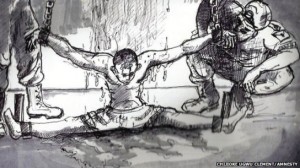by Vu Quoc Ngu, Nov 10, 2014
Defend the Defenders
Torture as a crime should be included in Vietnam’s Penal Code in order to prevent and address all forms of torture, said a number of legal experts.

All acts of torture should be criminalized by labeling it as a crime with punishments similar to those stipulated for crimes in Chapter XXIV of the Penal Code, which range from 10 years in prison to the death penalty, said Dr. Dao Thi Le Thu from the Ho Chi Minh City University of Law at an international seminar focusing on the UN Convention against Torture and Other Cruel Inhumane or Degrading Treatment or Punishment (UNCAT).
During the workshop co-organized by the Vietnam Lawyers Association and the HCM City University of Law on Nov 7, participants highlighted the importance of UNCAT, Vietnam’s obligations to issue regulations in accordance with the convention, and criminal liability of torture as well as the prevention of torture in the first place.
Vietnam needs to strengthen the legal rights of prisoners and defendants, including the right to remain silent in order to prevent torture, said Prof. Dr Dao Tri Uc from the Hanoi National University.
At the same time, the country has to improve the supervisory role of the legislative body National Assembly (NA)’s Justice Committee and legislators in the field, while completing the Law on State Compensation, he said.
Associate Prof. Dr Tran Do, deputy chief judge of the Supreme People’s Court, stressed the need to specify measures to prevent torture and complete regulations on the legal status of detainees to safeguard respect for human rights and rights to legal support.
Other participants said it is necessary to clarify a number of regulations, including those on cases interrogated at night, the observation of defendants and prisoners’ rights to remain silent, and regulations on professional measures applied during interrogation process.
Torture is a systemic problem in the communist nation, where the police forces have been given too much power to protect the ruling party.
According to the Human Rights Watch’s report released in mid-Sept, police’s abuse occurs in 44 provinces and five largest cities in all Vietnamese regions between August 2010 and July 2014. During the four-year period, 28 Vietnamese died in police custody during their detention period, while 11 others were severely beaten by investigators.
Local activists said 67 Vietnamese have died in police stations or died after getting beaten by the police between Aug 8, 2010 and Aug 18, 2014. As many as 36 of them were said to have committed suicides, 29 died “by hanging themselves.”
As many as 20 Vietnamese have been found dead in local police stations across the nation so far this year, heightening concerns about the rampant police torture, according to the state-run media.
On Oct 23, Vietnamese President Truong Tan Sang President Truong Tan Sang asked the country’s legislative body National Assembly to ratify the UNCAT.
However, Vietnam said it will not directly apply the convention as it contains some contents that are not regulated in the country’s legal system. The implementation of the convention will abide by its Constitution as well as bilateral cooperation or multi-lateral ties with other countries on a back-to-back basis.
Height Insoles: Hi, I do believe this is an excellent site. I stumbledupon …
http://fishinglovers.net: Appreciate you sharing, great post.Thanks Again. Keep writi…
Achilles Pain causes: Every weekend i used to pay a quick visit this site, as i w…






November 10, 2014
Vietnam Urged to Criminalize Torture to Halt Corporal Treatment
by Nhan Quyen • [Human Rights]
However, Vietnam said it will not directly apply the convention as it contains some contents that are not regulated in the country’s legal system. The implementation of the convention will abide by its Constitution as well as bilateral cooperation or multi-lateral ties with other countries on a back-to-back basis.